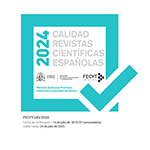Justice, satisfaction and counterproductive behaviour: A Job Demands-Resources (JD-R) theory study on Social Workers
Abstract
Social work professionals have to confront an increasingly strenuous job context (e.g., more users into the system, budgetary cuts, increasing bureaucracy, etc.), and these changes added to their interest in social justice turn their job into a very demanding one. Furthermore, over the few last years, organizational justice has produced a great deal of research, although not in this particular discipline. Based on the Job Demands and Resources theory (JD-R), this paper analyses (1) the direct relationships of job demands (Demands) and organizational justice (Resource) on job satisfaction and on counterproductive behaviour, and (2) the buffering effect of organizational justice as a resource, on the relationship between job demands and job satisfaction, and between job demands and counterproductive behaviour. The sample is made up of 213 social work professionals from various Spanish regions (198 female and mean-age 40.56 years old). Hierarchical regression equations showed that more than job demands, it is organizational justice which is the variable that exerts the highest influence on results (satisfaction and counterproductive behaviour). Specifically, organizational justice explains a great deal of the variance on job satisfaction (40%). Justice also impacts on counterproductive behaviour, both directly as well as reducing the negative effect of high demands. These findings are important both from the theoretical and applied perspectives, since these underline the key role of organizational justice for social workers, beyond job demands.Downloads
Article download
License
In order to support the global exchange of knowledge, the journal Cuadernos de Trabajo Social is allowing unrestricted access to its content as from its publication in this electronic edition, and as such it is an open-access journal. The originals published in this journal are the property of the Complutense University of Madrid and any reproduction thereof in full or in part must cite the source. All content is distributed under a Creative Commons Attribution 4.0 use and distribution licence (CC BY 4.0). This circumstance must be expressly stated in these terms where necessary. You can view the summary and the complete legal text of the licence.









